- Home
- Bertolt Brecht
Bertolt Brecht: Mutter Courage und ihre Kinder 7 Page 21
Bertolt Brecht: Mutter Courage und ihre Kinder 7 Read online
Page 21
THE SINGER
Why so gay, you, making for home?
THE MUSICIANS
Because with a smile the child
Has won new parents for himself, that’s why I’m gay.
Because I am rid of the loved one
That’s why I’m happy.
THE SINGER
And why are you sad?
THE MUSICIANS
I’m sad because I’m single and free
Of the little burden in whom a heart was beating:
Like one robbed, like one impoverished I’m going.
Grusha walks for a short while, then meets the two Ironshirts, who hold her up at the point of a lance.
THE CORPORAL: Young lady, you’re running into the Armed Forces. Where are you coming from? When are you coming? Are you entertaining illegal relations with the enemy? Where is he hiding? What sort of movements is he making in your rear? What about the hills? What about the valley? How are your stockings fastened?
Grusha stands there frightened.
GRUSHA: They are strongly fastened; you’d better withdraw.
THE CORPORAL: I always withdraw. In that respect I’m reliable. Why are you staring like that at the lance? In the field a soldier never loses control of his lance. That’s an order. Learn it by heart, blockhead. Now then, young lady, where are you off to?
GRUSHA: To my intended, one Simon Chachava, of the Palace Guard in Nukha. Wait till I write to him; he’ll break your bones for you.
THE CORPORAL: Simon Chachava? Indeed! I know him. He gave me the key so I could keep an eye on you once in a while. Blockhead, we’re getting unpopular. We must make her realize we have honourable intentions. Young lady, my apparent flippancy hides a serious nature. So I’ll tell you officially: I want a child from you.
Grusha utters a little scream.
Blockhead, she has understood. Ooh, isn’t that a sweet fright! ‘But first I must take the bread out of the oven, Officer! But first I must change my torn chemise, Colonel!’ But joking apart. Listen, young lady, we are looking for a certain child in these parts. Have you heard of a child from the city, of good family, dressed in fine linen?
GRUSHA: No. I’ve heard nothing.
THE SINGER
Run, kind heart! The killers are coming!
Help the helpless child, helpless girl! And so she runs.
Suddenly, panic-stricken, she turns round and runs. The Ironshirts glance at each other, then follow her, cursing.
THE MUSICIANS
In the bloodiest times
There are still good people.
As Grusha enters the cottage, the peasant woman is bending over the child’s crib.
GRUSHA: Hide it! Quick! The Ironshirts are coming! It was I who laid it on your doorstep. But it isn’t mine. It’s of a noble family.
THE PEASANT WOMAN: Who’s coming? What sort of Ironshirts?
GRUSHA: Don’t ask questions. The Ironshirts who are looking for it.
THE PEASANT WOMAN: They’ve no business in my house. But it seems I must have a word with you.
GRUSHA: Take off the fine linen. That will give us away.
THE PEASANT WOMAN: Oh, you and your linen! In this house I decide. And don’t you mess up my room. But why did you abandon it? That’s a sin.
GRUSHA looking out of the window: There, they’re coming from behind the trees. I shouldn’t have run away. That gave them ideas. What on earth shall I do?
THE PEASANT WOMAN looking out of the window and suddenly starting with fear: Jesus and Mary! Ironshirts!
GRUSHA: They’re after the child!
THE PEASANT WOMAN: But suppose they come in!
GRUSHA: You mustn’t give it to them. Say it’s yours.
THE PEASANT WOMAN: Yes.
GRUSHA: They’ll run it through if you let them have it.
THE PEASANT WOMAN: But suppose they demand it? The money for the harvest is in the house.
GRUSHA: If you let them have it, they’ll run it through, here in your room! You’ve got to say it’s yours.
THE PEASANT WOMAN: Yes, but suppose they don’t believe me?
GRUSHA: You must speak firmly.
THE PEASANT WOMAN: They’ll burn the roof over our head.
GRUSHA: That’s why you’ve got to say it’s yours. His name’s Michael. I shouldn’t have told you that.
The peasant woman nods.
Don’t nod your head like that. And don’t tremble; they’ll notice.
THE PEASANT WOMAN: Yes.
GRUSHA: Stop saying yes. I can’t stand it any longer. She shakes her. Haven’t you got a child?
THE PEASANT WOMAN muttering: In the war.
GRUSHA: Then perhaps he’s an Ironshirt, too, by now? And what if he ran children through? You’d give him a fine piece of your mind! ‘Stop waving that lance in my room! Is that what I’ve reared you for? Go and wash your neck before you speak to your mother.’
THE PEASANT WOMAN: That’s true, I wouldn’t let him behave like that.
GRUSHA: Promise me you’ll say it’s yours.
THE PEASANT WOMAN: Yes.
GRUSHA: There! They’re coming!
There is a knocking at the door. The women don’t answer. Enter the Ironshirts. The peasant woman bows deeply.
THE CORPORAL: Well, there she is. What did I tell you? My nose. I smelled her. Young lady, I have a question to ask you: Why did you run away? What did you think I would do to you? I’ll bet it was something lewd. Confess!
GRUSHA while the peasant woman continues to bow: I’d left the milk on the stove. Then I suddenly remembered it.
THE CORPORAL: I thought it was because you imagined I’d looked at you in a lewd way—as if I were thinking there could be something between us. A lustful glance, know what I mean?
GRUSHA: I didn’t see that.
THE CORPORAL: But it could have been, eh? You must admit that. After all, I could be a swine. I’m quite frank with you: I could think of all sorts of things if we were alone. To the peasant woman: Haven’t you got something to do in the yard? The chickens to feed?
THE PEASANT WOMAN falling suddenly to her knees: Soldier, I didn’t known anything about it. Please don’t set my house on fire.
THE CORPORAL: What are you talking about?
THE PEASANT WOMAN: I have nothing to do with it. She left it on the doorstep, I swear.
THE CORPORAL suddenly sees the child and whistles: Ah, there’s a little one in the crib! Blockhead, I smell a thousand piastres. Take the old girl out and hold on to her. It looks as though I’ll have to do some cross-examining.
The peasant woman lets herself be led out by the soldier, without a word.
Well, there’s the child I wanted to have from you. He walks towards the crib.
GRUSHA: Officer, it’s mine. It’s not the one you’re after.
THE CORPORAL: I’ll just have a look at it. He bends over the crib. Grusha looks round in despair.
GRUSHA: It’s mine! It’s mine!
THE CORPORAL: Nice linen!
Grusha jumps at him to pull him away. He throws her off and again bends over the crib. Looking round in despair, she suddenly sees a big log of wood, seizes it in panic, and hits the Corporal over the head from behind. She quickly picks up the child and dashes off.
THE SINGER
After her escape from the Ironshirts
After twenty-two days of wandering
At the foot of the Janga-Tau glacier
From this moment Grusha Vachnadze decided to be the child’s mother.
THE MUSICIANS
The helpless girl
Became the mother of the helpless child.
Grusha squats over a half-frozen stream to ladle some water in her hand for the child.
GRUSHA
Nobody wants to take you
So I shall have to take you
There is no-one else but me, my dear
On this black day in a meagre year
Who will not forsake you.
Since I’ve carried you too lo
ng
And with sore feet
Since the milk was too dear
I grew fond of you.
(I wouldn’t be without you any more.)
I’ll throw your fine little shirt away
And wrap you in rags
I’ll wash you and christen you
With glacier water.
(You’ll have to bear it.)
She has taken off the child’s fine linen and wrapped it in a rag.
THE SINGER
When Grusha Vachnadze, pursued by the Ironshirts
Came to the narrow footbridge of the Eastern slope
She sang the song of the rotten bridge
And risked two lives.
A wind has risen. The bridge on the glacier is visible in the semi-darkness. One rope is broken, and half the bridge is hanging down the precipice. Merchants, two men and a woman, stand undecided before the bridge as Grusha and the child arrive. One man is trying to retrieve a hanging rope with a stick.
THE FIRST MAN: Take your time, young woman. You won’t get over that pass anyway.
GRUSHA: But I simply have to get my child over to the east side. To my brother.
THE MERCHANT WOMAN: Have to? What d’you mean by have to? I have to get there, too—because I have to buy two carpets in Atum—carpets a woman had to sell because her husband had to die. But can I do what I have to; can she? Andrei has been fishing for two hours for that rope. And I ask you, how are we to fasten it, even if he gets it?
THE FIRST MAN listening: Shush, I think I hear something.
GRUSHA: The bridge is not quite rotten. I think I’ll try and cross it.
THE MERCHANT WOMAN: I wouldn’t try that even if the devil himself were after me. It’s suicide.
THE FIRST MAN shouting: Hi!
GRUSHA: Don’t shout! To the merchant woman. Tell him not to shout.
THE FIRST MAN: But someone down there’s calling. Perhaps they’ve lost their way.
THE MERCHANT WOMAN: And why shouldn’t he shout? Is there something wrong with you? Are they after you?
GRUSHA: Well, I’ll have to tell you. Ironshirts are after me. I knocked one down.
THE SECOND MAN: Hide our merchandise!
The woman hides a sack behind a rock.
THE FIRST MAN: Why didn’t you tell us that at once? To the other: If they catch her they’ll make mincemeat out of her!
GRUSHA: Get out of my way. I’ve got to cross that bridge.
THE SECOND MAN: You can’t. There’s a precipice of two thousand feet.
THE FIRST MAN: Even if we could get the rope it wouldn’t make sense. We could hold it with our hands, but then the Ironshirts could get across in the same way.
GRUSHA: Out of my way.
Shouts from a distance: ‘Let’s get up there!’
THE MERCHANT WOMAN: They’re getting near. But you can’t take the child across that bridge. It’s sure to break. Just look down!
Grusha looks down the precipice. The Ironshirts are heard shouting below.
THE SECOND MAN: Two thousand feet!
GRUSHA: But those men are worse.
THE FIRST MAN: Anyway you can’t do it with the child. Risk your own life if they are after you, but not the child’s.
THE SECOND MAN: She’s even heavier with the child.
THE MERCHANT WOMAN: Perhaps she’s really got to go. Give it to me. I’ll hide it and you cross the bridge alone.
GRUSHA: I won’t. We belong together. To the child: Live together, die together. She sings:
If the gulf is deep
And the rotten bridge sways
It is not for us, son
To choose our ways.
The way that I know
Is the one for your feet
The bread that I find
Is all you will eat.
Of every four morsels
You shall have three.
I would that I knew
How big they will be!
I’ll try it.
THE MERCHANT WOMAN: That’s tempting God.
Shouts from beneath.
GRUSHA: I beg you, throw that stick away, or they’ll get the rope and follow me.
She starts off on to the swinging bridge. The merchant woman screams when the bridge looks like breaking. But Grusha walks on and reaches the far side.
THE FIRST MAN: She’s done it!
THE MERCHANT WOMAN who has fallen on her knees and begun to pray, angrily: But I still think it was a sin.
The Ironshirts appear, the Corporal’s head bandaged.
THE CORPORAL: Have you seen a woman with a child?
THE FIRST MAN while the second throws away his stick: Yes, there she is! But the bridge won’t carry you!
THE CORPORAL: Blockhead, you’ll suffer for this!
Grusha, from the far bank, laughs and shows the child to the Iron-shirts. She walks on. The bridge is left behind. Wind.
GRUSHA to the child: You mustn’t mind the wind. It’s only a poor wretch, too. It has to push the clouds, and it feels the cold more than any of us. Snow starts falling. And the snow isn’t the worst, Michael. It covers the little fir trees, so that they won’t die in winter. And now I’ll sing you a little song. Listen! She sings:
Your father’s a thief
Your mother’s a whore:
All the nice people
Will love you therefore.
The son of the tiger
Brings the foals their feed
The snake-child milk
To mothers in need.
4
IN THE NORTHERN MOUNTAINS
THE SINGER
Seven days the sister wandered.
Across the glacier, down the hills she wandered.
‘When I enter my brother’s house’, she thought to herself
‘He will rise and embrace me’.
‘Is that you, sister?’ he will say
‘I have been expecting you for so long. This here is my dear wife.
And this is my farm, come to me by marriage.
With eleven horses and thirty-one cows. Sit down.
Sit down with your child at our table and eat.’
The brother’s house was in a lovely valley.
When the sister came to the brother she was ill from her wanderings.
The brother rose from the table.
A fat peasant couple who have just sat down to a meal. Lavrenti Vachnadze already has a napkin round his neck, as Grusha, pale and supported by a stableman, enters with the child.
LAVRENTI: Where do you come from, Grusha?
GRUSHA feebly: I’ve walked across the Janga-Tau Pass, Lavrenti.
STABLEMAN: I found her in front of the hay barn. She has a child with her.
THE SISTER-IN-LAW: Go and groom the roan. Exit stableman.
LAVRENTI: This is my wife, Aniko.
THE SISTER-IN-LAW: We thought you were in service in Nukha.
GRUSHA barely able to stand: Yes, I was there.
THE SISTER-IN-LAW: Wasn’t it a good job? We were told it was a good one.
GRUSHA: The Governor has been killed.
LAVRENTI: Yes, we heard there were riots. Your aunt told us about it. Remember, Aniko?
THE SISTER-IN-LAW: Here, with us, it’s quiet. City people always need some kind of excitement. She walks towards the door and shouts: Sosso, Sosso, take the flat cake out of the oven, d’you hear? Where are you? Exit, shouting.
LAVRENTI quietly, quickly: Has it got a father? As she shakes her head: I thought so. We must think up something. She’s very pious.
THE SISTER-IN-LAW returning: These servants! To Grusha: You have a child?
GRUSHA: It’s mine. She collapses. Lavrenti helps her up.
THE SISTER-IN-LAW: Mary and Joseph, she’s ill—what are we to do?
Lavrenti tries to lead Grusha to the bench by the stove. Aniko waves her away in horror and points to the sack by the wall.
LAVRENTI escorting her to the wall: Sit down, sit down. I think it’s just weakness.
&nb
sp; THE SISTER-IN-LAW: As long as it’s not scarlet fever.
LAVRENTI: Then she’d have spots. I’m sure it’s only weakness. Don’t worry, Aniko. To Grusha: Do you feel better sitting?
THE SISTER-IN-LAW: Is the child hers?
GRUSHA: It’s mine.
LAVRENTI: She’s on her way to her husband.
THE SISTER-IN-LAW: Really? Your meat’s getting cold. Lavrenti sits down and begins to eat. Cold food’s not good for you. At least the fat parts mustn’t get cold; you know your stomach’s your weak spot. To Grusha: If your husband’s not in town, where is he then?
LAVRENTI: She got married on the other side of the mountain, she says.
THE SISTER-IN-LAW: Oh, on the other side. She also sits down to eat.
GRUSHA: I think I’ll have to lie down somewhere, Lavrenti.
THE SISTER-IN-LAW goes on questioning her: If it’s consumption we’ll all get it. Has your husband a farm?
GRUSHA: He’s a soldier.
LAVRENTI: But he’s coming into a farm—a small farm from his father.
THE SISTER-IN-LAW: Isn’t he in the war? Why not?
GRUSHA wearily: Yes, he’s in the war.
THE SISTER-IN-LAW: Then why d’you want to go to the farm?
LAVRENTI: When he comes back from the war, he’ll come to his farm.
THE SISTER-IN-LAW: But you’re going there now?
LAVRENTI: Yes, to wait for him.
THE SISTER-IN-LAW shrilly: Sosso, the cake!
GRUSHA murmurs in fever: A farm—a soldier—waiting—sit down—eat.
THE SISTER-IN-LAW: That’s scarlet fever.
GRUSHA starting up: Yes, he has a farm!
LAVRENTI: I think it must be weakness, Aniko. Wouldn’t you like to go and look after the cake yourself, my dear?
THE SISTER-IN-LAW: But when will he come back if the war, as they say, has broken out again? Waddling away, shouting: Sosso! Where are you? Sosso!
LAVRENTI getting up quickly and going to Grusha: You’ll get a bed in a moment. She has a good heart. But only after supper.
GRUSHA holding out the child to him: Take it. He takes it, looking anxiously round.
LAVRENTI: But you can’t stay here long. You must realize she’s very pious.
Grusha collapses. Lavrenti takes hold of her.
THE SINGER
The sister was too ill.
The cowardly brother had to give her shelter.
The autumn passed, the winter came.
The winter was long

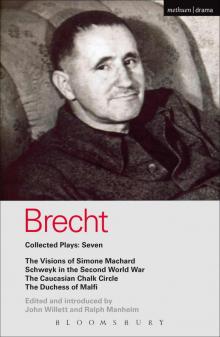 Bertolt Brecht: Mutter Courage und ihre Kinder 7
Bertolt Brecht: Mutter Courage und ihre Kinder 7 Bertolt Brecht
Bertolt Brecht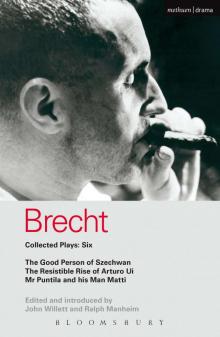 Bertolt Brecht: Mutter Courage und ihre Kinder 6
Bertolt Brecht: Mutter Courage und ihre Kinder 6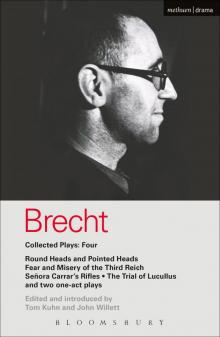 Bertolt Brecht: Mutter Courage und ihre Kinder 4
Bertolt Brecht: Mutter Courage und ihre Kinder 4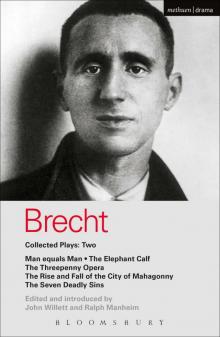 Bertolt Brecht: Mutter Courage und ihre Kinder 2
Bertolt Brecht: Mutter Courage und ihre Kinder 2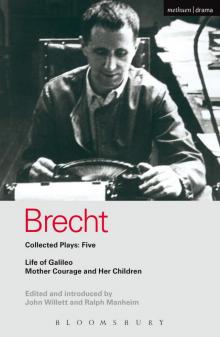 Bertolt Brecht: Mutter Courage und ihre Kinder 5
Bertolt Brecht: Mutter Courage und ihre Kinder 5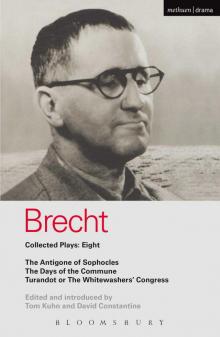 Collected Plays, Volume 4 (Bertolt Brecht: Plays, Poetry & Prose) 8
Collected Plays, Volume 4 (Bertolt Brecht: Plays, Poetry & Prose) 8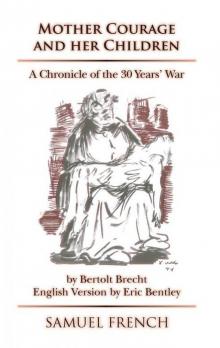 Mother Courage and Her Children
Mother Courage and Her Children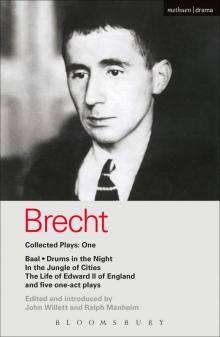 Bertolt Brecht: Mutter Courage und ihre Kinder 1
Bertolt Brecht: Mutter Courage und ihre Kinder 1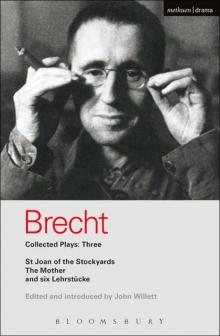 Brecht Collected Plays: 3: Lindbergh's Flight; The Baden-Baden Lesson on Consent; He Said Yes/He Said No; The Decision; The Mother; The Exception & the ... St Joan of the Stockyards (World Classics)
Brecht Collected Plays: 3: Lindbergh's Flight; The Baden-Baden Lesson on Consent; He Said Yes/He Said No; The Decision; The Mother; The Exception & the ... St Joan of the Stockyards (World Classics)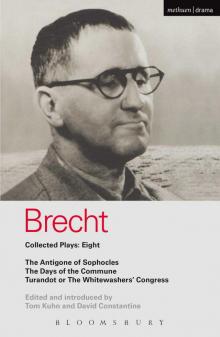 Brecht Plays 8: The Antigone of Sophocles; The Days of the Commune; Turandot or the Whitewasher's Congress: The Antigone of Sophocles , The Days of the Comm (World Classics)
Brecht Plays 8: The Antigone of Sophocles; The Days of the Commune; Turandot or the Whitewasher's Congress: The Antigone of Sophocles , The Days of the Comm (World Classics)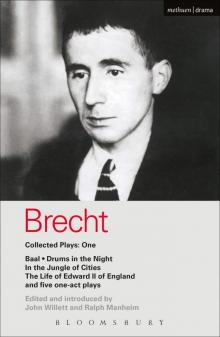 Brecht Collected Plays: 1: Baal; Drums in the Night; In the Jungle of Cities; Life of Edward II of England; & 5 One Act Plays: Baal , Drums in the Night , In the Jungle of Ci (World Classics)
Brecht Collected Plays: 1: Baal; Drums in the Night; In the Jungle of Cities; Life of Edward II of England; & 5 One Act Plays: Baal , Drums in the Night , In the Jungle of Ci (World Classics)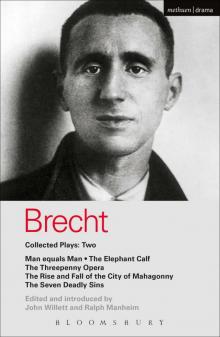 Brecht Collected Plays: 2: Man Equals Man; Elephant Calf; Threepenny Opera; Mahagonny; Seven Deadly Sins: Man Equals Man , Elephant Calf , Threepenny Ope (World Classics)
Brecht Collected Plays: 2: Man Equals Man; Elephant Calf; Threepenny Opera; Mahagonny; Seven Deadly Sins: Man Equals Man , Elephant Calf , Threepenny Ope (World Classics)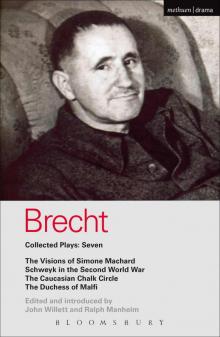 Brecht Collected Plays: 7: Visions of Simone Machard; Schweyk in the Second World War; Caucasian Chalk Circle; Duchess of Malfi (World Classics)
Brecht Collected Plays: 7: Visions of Simone Machard; Schweyk in the Second World War; Caucasian Chalk Circle; Duchess of Malfi (World Classics)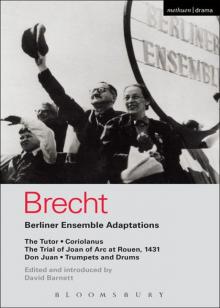 Berliner Ensemble Adaptations
Berliner Ensemble Adaptations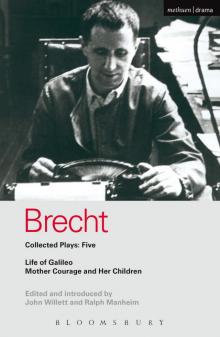 Brecht Collected Plays: 5: Life of Galileo; Mother Courage and Her Children (World Classics)
Brecht Collected Plays: 5: Life of Galileo; Mother Courage and Her Children (World Classics)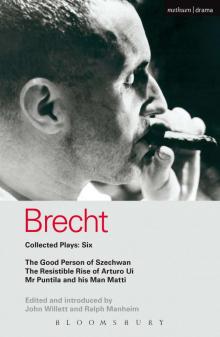 Brecht Collected Plays: 6: Good Person of Szechwan; The Resistible Rise of Arturo Ui; Mr Puntila and his Man Matti (World Classics)
Brecht Collected Plays: 6: Good Person of Szechwan; The Resistible Rise of Arturo Ui; Mr Puntila and his Man Matti (World Classics)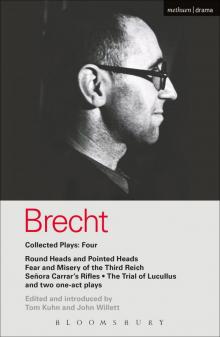 Brecht Collected Plays: 4: Round Heads & Pointed Heads; Fear & Misery of the Third Reich; Senora Carrar's Rifles; Trial of Lucullus; Dansen; How Much Is ... and Misery , Carr (World Classics)
Brecht Collected Plays: 4: Round Heads & Pointed Heads; Fear & Misery of the Third Reich; Senora Carrar's Rifles; Trial of Lucullus; Dansen; How Much Is ... and Misery , Carr (World Classics)